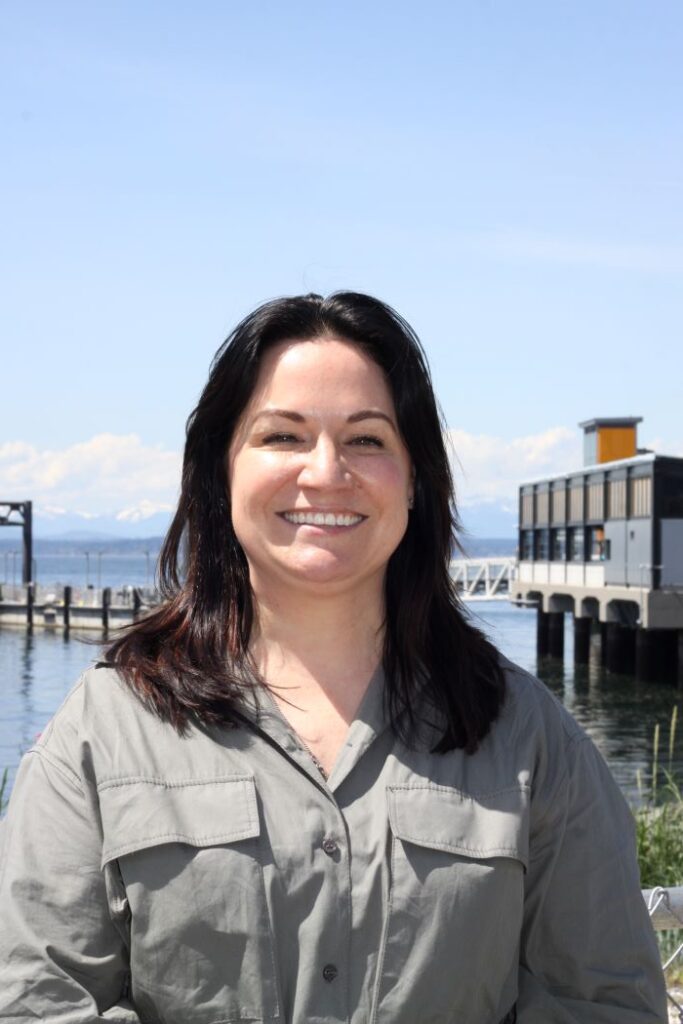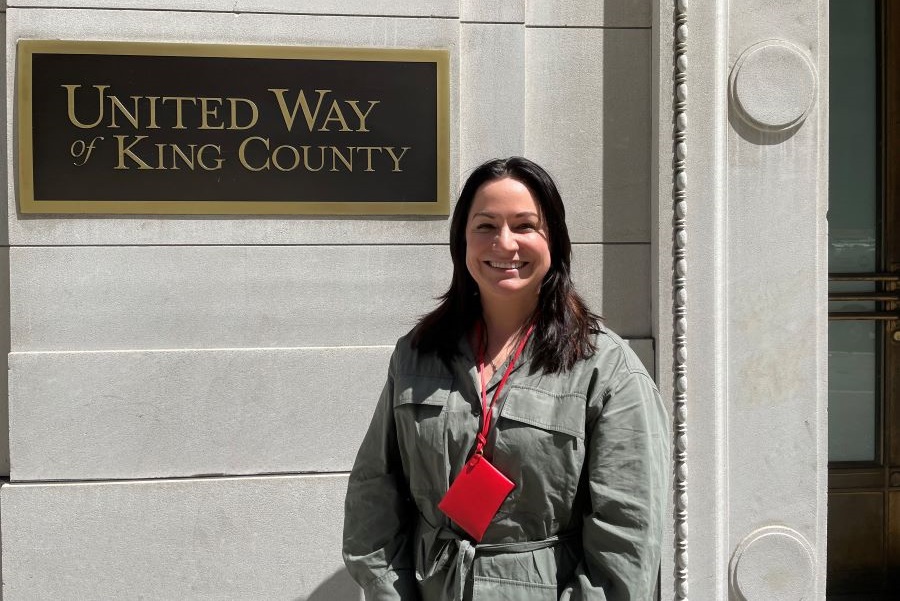Say Hello to Our New Chief Philanthropy Officer!
Lindsay Harper, a former Las Vegas resident who has spent more than 15 years developing social justice centered fundraising campaigns for youth and families in Southern Nevada, is United Way of King County’s new chief philanthropy officer.
Lindsay, who earned her master’s in public administration degree from the University of Washington, is responsible for all United Way, development, planning, and implementation of innovative fundraising strategies for corporate, individual and major giving programs.
With a focus on education and economic mobility for marginalized communities, Lindsay has dedicated her professional career to social justice and understands the importance of supporting the longer-term work to change oppressive systems and structures. We recently sat down with Lindsay to chat about her new role at United Way.
United Way of King County: Tell us a little bit about Lindsay Harper and what led you to United Way.
Lindsay Harper: I grew up with a dad who was a civil rights attorney. It was part of my childhood to understand that we are here on this earth to help one another. What our dad would quote to us most often is Dr. Martin Luther King Jr.’s sermon, “Drum Major Instinct,” and the line from it, “Be a drum major for justice” is what he would challenge my brother and I to be.
This was the imbedded curriculum from my childhood, to be somebody who works in public service that was working for the betterment of our community and to make it a more just place.
When I graduated from college in Las Vegas, I applied for an internship with the I Have a Dream Foundation, which works with predominantly low-income, historically underserved students to get them to college.
I fell in love with the work there and started to see that the work being done there, while it was admirable, was not as effective or impactful as it should be. The reality in Las Vegas was that organizations were not working together to move the needle for the people they were working alongside.
United Way of King County: What was your response to that?
Lindsay Harper: I started collecting data and meeting with people around the country, including Geoffrey Canada, who founded Harlem Children’s Zone [an organization that increases high school and graduation rates among students in New York’s Harlem neighborhood]. Then I launched my own program called Core in 2015. [Core is a long-term, multi-generational organization with afterschool and weekend programming and services for under-resourced students from sixth grade to 12th grade and their families].
We provided everything that their families and they needed toward the goal of economic mobility. We knew that to solve intergenerational poverty you have to develop wealth. So, we would work with families to get better jobs and with students to go to trade school, so that we really created systems-levels change within those families.

United Way of King County: So, how did you vault from that work to the work you’ll be doing at United Way, which is rooted in fundraising and donor relations?
Lindsay Harper: I have enjoyed my entire career in the fundraising aspect and the development aspect, starting a very small nonprofit and growing that nonprofit to be a multi-million-dollar agency. I am the one that led the work around development and how to find different streams of income to diversify our fundraising base. That was looking at government and public money, working with private family foundations and corporations to be able to secure the resources needed to support the work being done.
In that space, I started to follow community-centric fundraising and the work by Edgar Villanueva [author of the book Decolonizing Wealth] and I realized that in order for us to meet the greater need and pivot the conversation toward economic justice we had to start decentralizing philanthropy around donors and instead making them partners in the work, not the work itself.
When you have been given great wealth, you have a responsibility to redistribute those funds in order to support the community and make it stronger. What I used to say to people in Las Vegas is that stronger kids and families benefit us all; it’s about how we make this a stronger community that’s more sustainable.
United Way of King County: As you look at United Way’s current development landscape, it’s challenges and where you see your fundraising work headed, what do you see?
Lindsay Harper: Our strategic roadmap is very exciting to me because it talks about how we infuse racial equity in all the work we’re doing. There is an opportunity to do more awareness and education work externally with our funders as to what that looks like. I also believe that everything we do at United Way has collective impact. It’s all working together to make the community stronger, which in turn benefits us all—and more importantly benefits historically underserved communities who have been left behind.
If you are making money off this community, so it’s a good thing to redistribute that [money] back in to make the community stronger.
Lindsay Harper
United Way of King County: How will interact with those communities?
Lindsay Harper: My heart is in programs. It’s where I started. I’ve talked with Regina [Malveaux, United Way chief impact officer] about meeting with leaders of the organizations we fund to truly understand what their needs are and the barriers they face. I’m a true believer that if you can equip resource development officers with a really great narrative and a true understanding from an authentic place what our community members are facing that turns into real fundraising opportunities.
United Way of King County: What would your message be to United Way’s individual donors or donor prospects?
Lindsay Harper: Their contribution goes to ensuring people in this community have a place to live, have food on their plates and students have an opportunity to reach their full potential through the work they’re doing. And all of that is done through a racial equity lens, which ensures that the funding is getting to the people who need it the most.
United Way of King County: What would you say to corporate funders?
Lindsay Harper: In order for this community to reach its potential and all of us to become stronger as a community, we need corporate investment in this work—to ensure that they have really great talented people to come into their workspaces. I think about the work that we are doing when it comes to equitable solutions for students: This is the future of their workforce, so we need to invest in that. A lot of the employees of some of the corporations we go to are working with people who often struggle, and so this provides a safety net for their employees, to ensure that their community is stronger. And also, it’s the right thing to do; you are making money off this community, so it’s a good thing to redistribute that back in to make the community stronger.
United Way of King County: What would you tell the government sector, particularly at a time when we will see a new governor and several new council people in local jurisdictions?
Lindsay Harper: I believe in upstream policy work. I think that organizations working directly with communities and are fundraising for communities have an opportunity to collect information about what is really going on with the struggles people face that are living with poverty and are historically underserved. I would want to communicate to them what is actually going on and how important their votes are and their political leverage is toward shifting the narrative around support and impact within communities.
The second thing I would say to them is the important investment the government can make in programs like United Way of King County. Look at the funding we received for rental assistance and how that was a game changer for thousands of people. Because of the structure of United Way of King County, we have the ability to distribute programs and funds in a way that no other agency can. This is a really great agency for them to invest in to create those larger impacts.


Comments